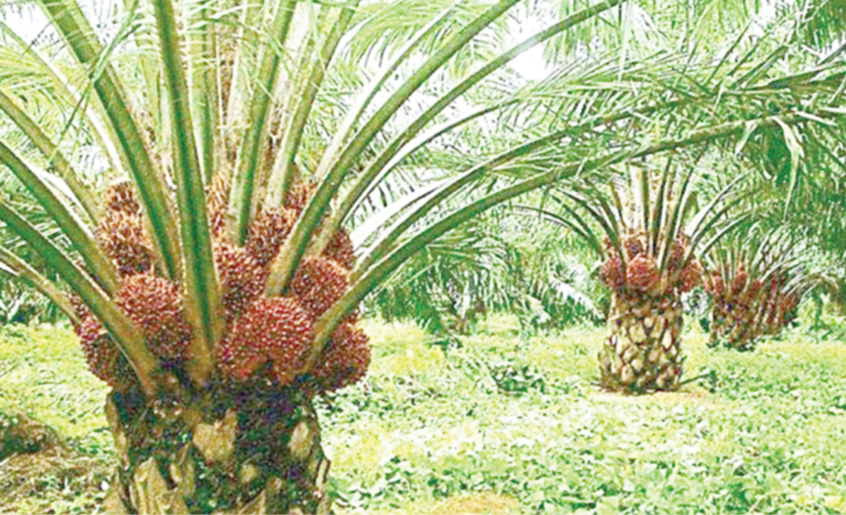Don’t ignore cocoa, cashew, coffee, oil palm, tea, Farmers beg Tinubu
The promotion of tree crops is one of the sectors that did not receive much attention during the previous government. Although Nigeria was the leading producer of some of the three crops, such as cocoa and oil palm in the 1960s, it has since lost its position among the producing countries that are earning billions […]

Oil palm farm
The promotion of tree crops is one of the sectors that did not receive much attention during the previous government.
Although Nigeria was the leading producer of some of the three crops, such as cocoa and oil palm in the 1960s, it has since lost its position among the producing countries that are earning billions of dollars every year.
The managing director/chief executive officer, Hebron Integrated Farms and Mills Ltd, and the national president of the National Palm Produce Association of Nigeria (NPPAN), Mr Alphonsus Inyang, while reacting to the president’s statement on agriculture, said attention should be given to tree crops like oil palm, cocoa, rubber, coffee, cashew, shea, dates, coconut, avocado, tea, grapes among other trees crops.
He argued that “these are the crops that can lay the foundation for an industrial nation. None of these tree or perennial crops yield for less than 40 years and rural economies can be built around crops for generational prosperity.
- Kogi Gov, SDP Guber Candidate Trade Blame Over Attack
- Subsidy removal: FG must commit to ameliorative policy
“President Ahmed Tinubu should not go the way of his predecessors; he should not make Nigeria a country of all agricultural commodities and import same commodities because of lack of focus on some specific commodities for primary production and processing.
“He should target some perennial commodities and get a dedicated fun to fund them in states where they have comparative advantage,” Mr Inyang said.
The NPPAN president frowned at a situation where the country is focusing on crops it does not have any comparative advantage in the global arena, adding that it wants to produce everything and import same things. He noted that America is known for soybeans and maize, Russia for wheat, Brazil, cassava and cocoa, Indonesia, oil palm, Malaysia, oil palm, Thailand, rice, India, rice and groundnuts.
“The new president should focus on crops with long value chains, develop clusters for primary production and processing for wealth creation. For example, every part of the oil palm tree is useful for industrial revolution.
“My association has engaged experts around the world that can help us create over one million jobs from the waste products of oil palm. We have also developed a nationwide programme that will create over five million jobs and lift over 5million households from poverty and launch them into generational wealth,” he said.
While some countries continue to grow stronger in the production of some tree crops, data continue to show that Nigeria’s production drive in the tree crops is dwindling.
The output of cocoa in the two top producers in the world, Côte d’Ivoire and Ghana, is greater halfway through the 2022-2023 main crop than the levels observed during the comparable period of the previous season. As at January 8, 2023, 1.346 million tonnes of cocoa beans had arrived at Côte d’Ivoire’s ports of export, an increase of 11.6 per cent from the previous year.
As at December 15, 2022, Ghana had purchased 350,000 tonnes of graded and sealed cocoa beans for the 2022/2023 crop year, a 76 per cent increase over the 199,000 tonnes bought at the same time the previous season.
Although Nigeria prides itself as the major supplier of seed to Malaysia in the 1960s, the country has since lost its position as a major producer, which now imports N30 billion worth of palm oil, according to the National Bureau of Statistics.
Globally, over 73.8 million metric tonnes of palm oil were produced globally in 2021-2022, an increase of 800,000 tonnes over the 73 million metric tonnes produced the previous year. Statistics data show that Nigeria, previously a major producer, produced just 1.8million tonnes of the global output.
Indonesia and Malaysia were the two nations that exported the most palm oil. Indonesia was the largest exporter of palm oil, totaling 28.5 million metric tonnes, while Malaysia came second with about 16.5 million metric tonnes of palm oil exported.
Other tea crops like coffee and tea subsector have completely collapsed despite the fact that Nigeria is one of the top consumers in Africa.
Coffee and tea are the second most traded global commodities after oil, and the most popular non-alcoholic beverage in the world. And despite the huge domestic potential, Nigeria does not produce a lot of coffee.
According to FAOSTAT, Nigeria produced only 2,100 tonnes of unroasted coffee in 2013. Demand for coffee has been continuously increasing. According to Euromonitor’s forecasts, Nigeria’s coffee consumption has increased by more than 20 per cent in the last decade.
Other tree crops like dates, cashew, rubber, avacado have huge potentials if properly promoted across the producing belts in the country.
